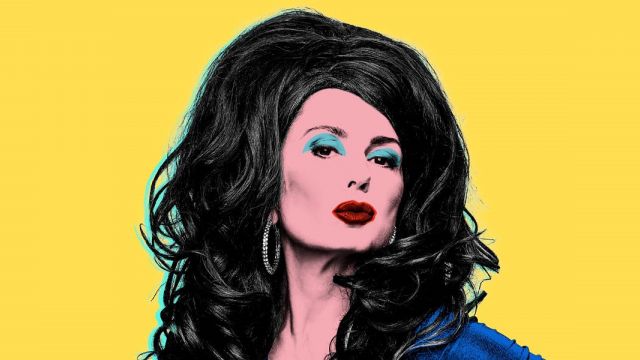Effie in Upyourselfness
In a show on political correctness vs freedom of speech, Mary Coustas took the stage at The Arts Centre last night in her much beloved Effie character. For those who don’t know Effie, she made her TV debut in the ‘90s show Acropolis Now, which I grew up watching. She became and still is an Australian icon, especially for the southern-European community.
I’m not sure how someone who is unfamiliar with Effie would understand or take Effie’s stage shows – some context is required. Effie belongs to particular era, of ‘90s working-class Australia, and although she has had several stage shows since then, such as Effie The Virgin Bride, she possesses a particular humour and vocabulary that is relevant to that time, and only those who lived during that time, or had parents or grandparents of that time, would fully appreciate her shows or fully understand her.
However, having said that, Coustas’s improvised comedic talent was highlighted when at the end of the stand-up section of her show she brought the house lights up and started chatting with ‘her peeps’. When she asked an audience member his age and ‘natio’, and it was revealed he was a high school student of Danish ancestry, she replied, ‘Do you know who I am?’ and the crowd roared with laughter.
Although Effie and such characters have been critiqued for stereotyping Greek culture, as time moves on we cannot underestimate their significant contribution to Australian working-class arts, and consequently ethnic migrant communities, something I am currently unpacking in my non-fiction book project, Not Till You’re Married. However, watching Coustas’s show last night, I feel that Coustas has taken it a step further than other characters in this space. Her work has evolved over time, whether that’s playing Effie or herself.

Last night I was amazed with her ability as a comedic writer and performer – she just keeps getting better and better and stronger. Through her shows she has been able to stay relevant to some of the social issues currently playing out not only within the Greek community, but within the wider working-class and Australian society. With Upyourselfness I feel she went a step further yet again. She may have been the boof-head into boys and hair back in the ‘90s, but today she has important things to say, points to make. In this show, a matured Effie of the ‘90s unapologetically gives us her take on things.
Sometimes, when I watch my favourite ‘90s icons, for me that’s Seinfeld, I often wonder what the Seinfeld of the ‘90s would have to say about the current state of play today. The TV show Seinfeld, for example, is littered with what many on the woke left would say is ‘politically incorrect, offensive material’. I love the show, so I could relate to Effie last night when she placed herself as sitting on the fence between political correctness and freedom of speech.
Effie’s show was funny, but was also quite serious, probably the most serious I’ve seen of the Effie shows. The Effie of the ‘90s has survived all this time, is still telling us jokes and making us laugh as she reminisces on old times and the Greek working-class who came to Australia with nothing. But Effie is now disillusioned with the current state of the world. She tells us that she never had the need to think, but now she has to think before she speaks. She’s never been so afraid to speak.
Explaining how she was ‘cancelled from high school’, she said that the only time she wants to hear the word ‘cancelled’ is in relation to a hairdressing appointment. Cleverly written with sharp, politically-incorrect yet hilarious imagery, this show was more social commentary than a straight up comedy. Within the show she opened topics such as the importance of intention, the complexity of being human, and that things are not as black and white as some groups make it. Greeks love to debate, she said. It’s a national sport. She reminded us that our parents came here with nothing, they were peasants. English was not their first language, so how can they be expected to say the right things, to be politically correct? Similarly, because her parents were of that time, then why is she expected to always say the right things too? Humans are far more complex than that, she said. As she spoke, it became clear that this politically correct mentality is further isolating certain communities. And that can’t be good.

Effie mirrored back to me my own frustrations in this politically correct world, where people are being cancelled left, right and centre. I too have had my fair share of black-listings. But Effie took control of the narrative, asserting her love for herself (her upyourselfness), reminding me to maintain my own upyourselfness, implying it was the only way to survive in this confusing world where people will go to the extent of pretending to say the ‘right things’, just to be accepted by current woke narratives.
I really enjoyed this show. I left feeling empowered and it gave me a lot of food for thought. Those frustrated with political correctness or those heavily into debating (most Greeks), will like it. I had an Anglo male friend with me who watched a bit of Acropolis Now in the ‘90s who really enjoyed it too.
Koraly Dimitriadis
Koraly Dimitriadis is a Cypriot-Australian poet, writer and performer and the author of Love and F—k Poems, Just Give Me The Pills and She’s Not Normal. Her theatre show I say the wrong things all the time premiered at La Mama.
Subscribe to our E-Newsletter, buy our latest print edition or find a Performing Arts book at Book Nook.

